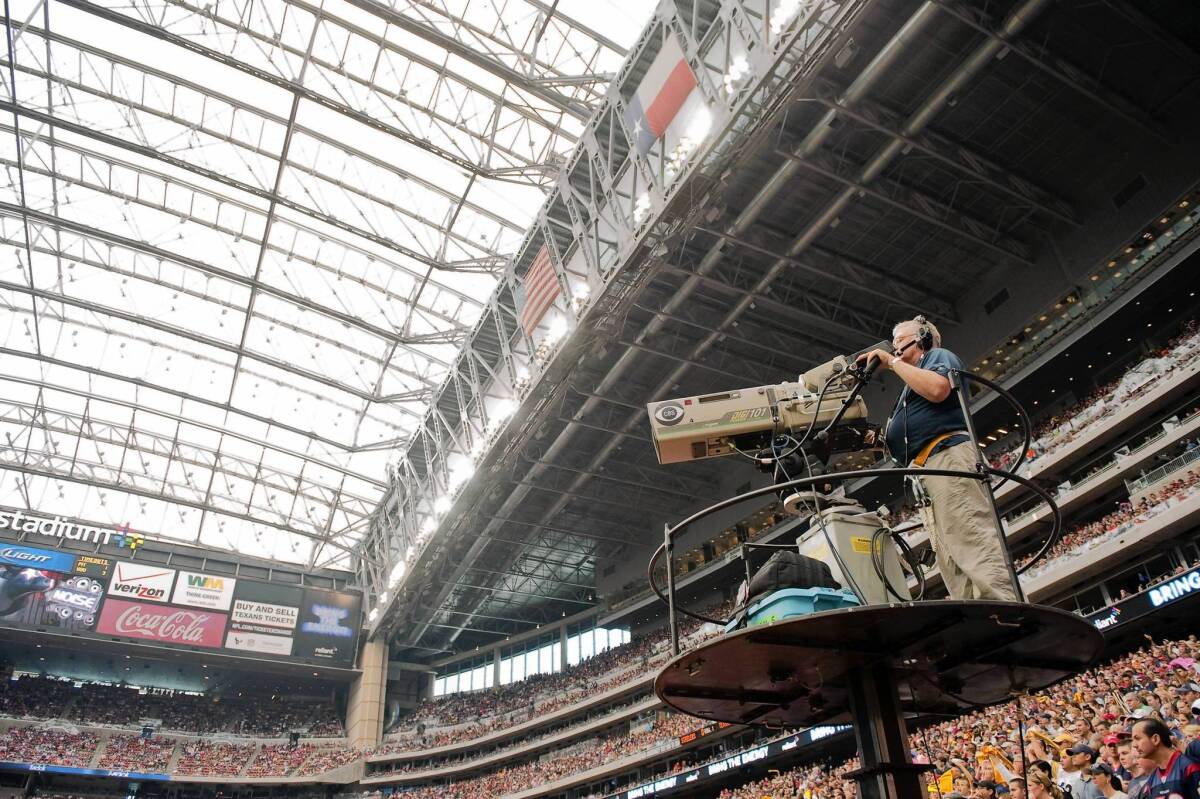CBS and Time Warner Cable reach deal to end monthlong blackout

After a monthlong blackout, Time Warner Cable Inc. and CBS Corp. reached an agreement that returned the broadcast network’s programming to millions of frustrated subscribers in Los Angeles, New York and Dallas.
The new distribution deal, which runs almost five years, came Monday afternoon after weeks of bitter negotiations and public posturing by the two media giants, with consumers caught in the middle. Besides CBS-owned stations including KCBS-TV Channel 2 and KCAL-TV Channel 9 in Los Angeles, the network’s premium channel Showtime was blacked out in Time Warner Cable homes.
But both companies had incentives to hammer out a new contract: The fall television season is just a few weeks away, and the National Football League regular season is set to kick off Sunday on CBS. CBS didn’t want to risk losing ratings and advertisers, while Time Warner Cable feared that subscribers would defect.
PHOTOS: Hollywood Backlot moments
Pressure to resolve the high-profile dispute was also coming from local and national lawmakers and regulators. The Los Angeles City Council scheduled a hearing for Tuesday to push both sides to an accord.
The Federal Communications Commission, which had urged the companies to make peace, praised the news of a settlement.
“I am pleased CBS and Time Warner Cable have resolved their retransmission consent negotiations,” acting FCC Chairwoman Mignon Clyburn said. “At the end of the day, media companies should accept shared responsibility for putting their audience’s interests above other interests and do all they can to avoid these kinds of disputes in the future.”
Terms of the new distribution contract were not revealed, but CBS Chief Executive Leslie Moonves said in an internal memo reviewed by The Times that the deal delivers “all the value and terms that we sought in these discussions.”
Time Warner Cable Chief Executive Glenn Britt said in a statement that while the cable operator “didn’t get everything we wanted, ultimately we ended up in a much better place than when we started.”
At issue in the negotiations were fees that CBS wanted Time Warner Cable to pay to carry its local TV stations. CBS was seeking a long-term pact that would see the subscriber fee Time Warner Cable pays to carry its local stations grow substantially.
PHOTOS: 2012 highest-paid media executives
Although neither side disclosed specifics, industry analysts and media insiders put the price tag Time Warner Cable was paying at about 80 cents per subscriber per month. CBS wanted a deal that would see those fees increase to more than $2 per subscriber per month over the life of the contract.
Time Warner Cable sought conditions that would limit CBS’ ability to sell its programs to broadband services such as Netflix or make its channels available to pay-TV distributors that could deliver content over the Internet instead of through cable or satellite. Such services are said to be in the works from Intel Corp. and Sony Corp.
In his memo to CBS staff, Moonves said the network has the “ability to monetize our content going forward on all the new, developing platforms that are right now transforming the way people watch television.”
The two sides may have come to terms, but that didn’t stop Britt from asking lawmakers to revisit the 1992 Cable Act, which cleared the way for broadcast networks such as CBS to seek financial compensation from pay-TV distributors such as Time Warner Cable.
“The rules are woefully out of date, are the primary reason cable bills are rising, and too frequently leave our customers without the programming they love. We sincerely hope that policymakers heed that call and take action to prevent these unfortunate blackouts soon,” Britt said.
Telecommunications analyst Craig Moffett of Moffett Research said the cable company might have scored some points in policy circles by raising a flag for the cable industry, but “Time Warner Cable ultimately had no choice but to settle.”
ON LOCATION: Where the cameras roll
“We may never know the final terms, but you can be sure that the settlement was ultimately a lot closer to what CBS was initially asking for than what TWC was initially offering to pay,” Moffett said.
The battle between the two media giants has also stirred up further frustration among consumers, more of whom believe that sky-high pay-TV bills are not worth the cost and will instead wait to see their favorite shows when episodes appear on Hulu, Netflix, Amazon or other new services.
For many Angelenos, the new agreement was met with relief tinged with anger that they were held hostage while two huge media conglomerates bickered over fees that probably would be passed on to the subscribers.
“The customers have been the victims here,” West Los Angeles resident Sheila Kern said. She particularly missed “Late Show With David Letterman.”
“We deserve a refund, but we probably aren’t going to get one. I pay the same amount every month, and it has not been fair because I’m not getting all the channels that I’m paying for,” Kern added.
Time Warner Cable provides television service to more than 1 million households or about a third of the homes in Los Angeles County. An estimated 80% of all cable subscribers in the region have Time Warner Cable service.
For Dodger fans, the protracted fight was particularly excruciating.
“I’m glad that they settled it but we missed at least nine Dodgers games on KCAL Channel 9 during the past month — when the Dodgers were on their most exciting win streak in decades — so it is still pretty disgusting,” said Ken Keller, 57, a business consultant who lives in Valencia.
Time Warner Cable has offered a credit for Showtime subscribers but no other credits or refunds for the disruption.
“Most of these things come together because of a deadline that is important to both sides, and in this case it was probably football,” Keller said. “One side was probably worried that they are going to lose a lot of money, and the other was losing a lot of customers.”
More to Read
From the Oscars to the Emmys.
Get the Envelope newsletter for exclusive awards season coverage, behind-the-scenes stories from the Envelope podcast and columnist Glenn Whipp’s must-read analysis.
You may occasionally receive promotional content from the Los Angeles Times.











